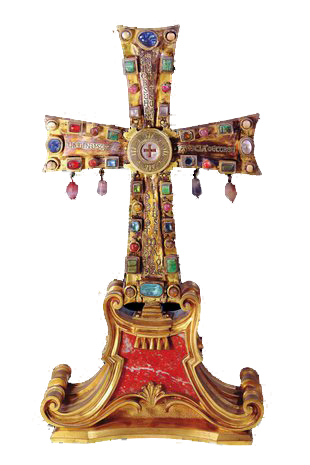
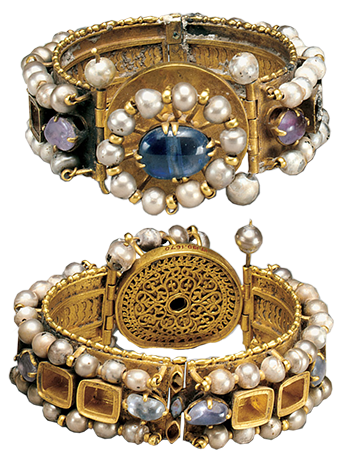
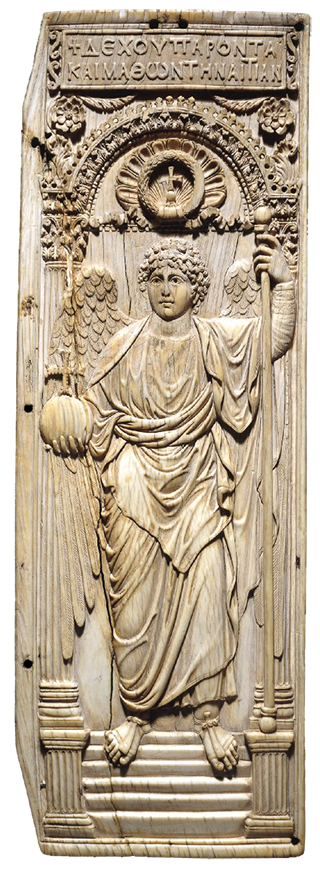
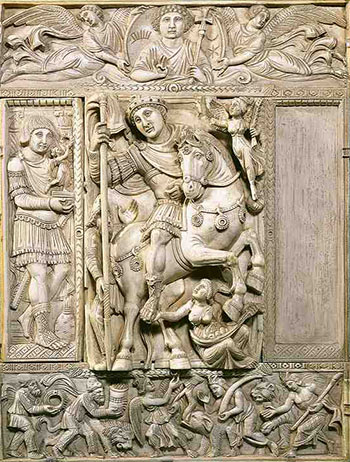
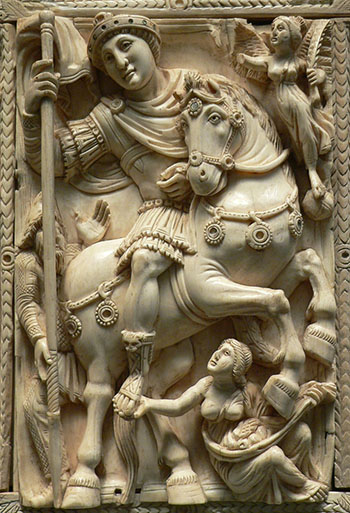
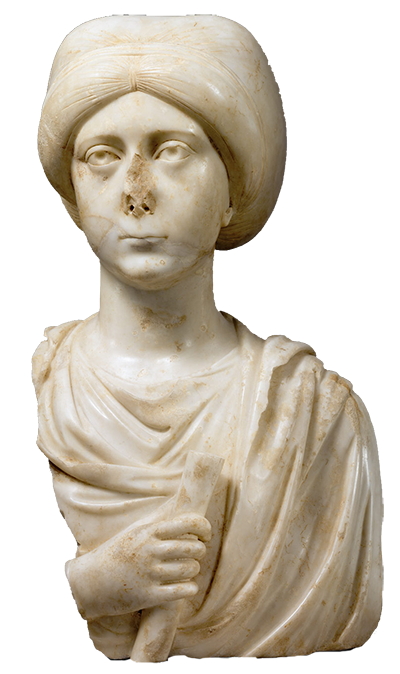
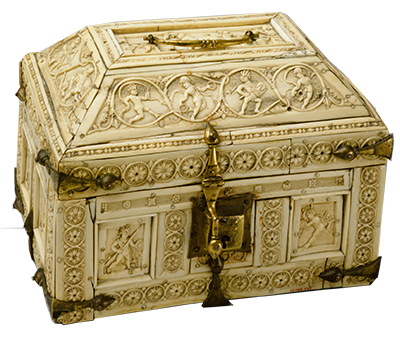

Justin and Sophia
The Empresses of Constantinople by Joseph McCabe
The Emperor Justinian continued for seventeen years after the death of Theodora to occupy the golden throne and keep the throne of his consort vacant. As he approached the term of his life the palace throbbed with the impassioned struggle which always disturbed the last year of a childless Emperor, and the courtiers took sides with the relatives of Theodora or of Justinian, according to their forecast of the future. On the one side was Sophia, the niece and heiress of Theodora: on the other the Emperor’s nephew, Justin. Sophia, however, was diplomatic in the pursuit of her ambition. She discarded the heresy which it had been expedient to cherish while her aunt lived, accepted the hand of Justin, and settled with him in his palace by the shore, near Theodora’s palace-monastery, to await impatiently the retirement of the aged Emperor.
Justinian, says the contemporary lawyer Evagrius, passed in the year 565 to “those tortures which are provided in the nether world” for rulers who despoil their subjects. The “greatness” of Justinian seems to have been discovered by his mediæval admirers; contemporary writers usually, and justly, attribute to his great general Belisarius the military triumphs which partially restored the outline of the Empire during his reign, and to the (probably) pagan lawyer Tribonian the compilation of the famous Justinian Code, leaving to the Emperor himself the odium of those unprincipled and unjustifiable extortions which weakened and distressed his subjects. However that may be, the Emperor’s last years53 were framed in a decaying world, and the citizens of Constantinople regarded with hesitating admiration the superb edifices which he had raised. His nephew Justin was “lord of the palace” (Curopalates), and had ample opportunity to ensure the succession.
A profoundly courtly and accommodating poet of the time, Corippus, has left us a touching account of the accession of Justin and Sophia. The noble Callinicus comes one night to rouse them in their suburban palace with the distressing news that Justinian is no more. The spouses arise, and sit discussing the situation in a room looking over the moonlit Sea of Marmora, when a group of Senators enter, and urge Justin to accept the purple. He shrinks from the terrible dignity until their tears and prayers override his modesty, and, as the first faint flush of dawn outlines the houses, they walk sadly through the streets to the sacred palace. The guards and Candidates and servants line the long avenue from the iron gate to the bronze door of Daphne, and many tears are shed over the body of the late Emperor, which lies on a lofty golden catafalque. Sophia produces a piece of embroidery on which all the illustrious victories of the great Emperor are depicted. By this time the report has spread in the town, and the citizens fly to the palace. The blues and greens in festive dress, with their respective standards, line the path to St Sophia, whither they go to ask grace, and they return to the palace to put on the robes of state. Then four strong soldiers raise Justin aloft, standing on a shield, and the patriarch crowns him and Sophia, and the Emperor passes to the Hippodrome to receive the loyal greeting of his people.
When we turn from this moving description to the prosy pages of the lawyer Evagrius we find—without surprise—that Corippus has very generously drawn upon the poet’s licence. Evagrius bluntly observes that Justin “took” the purple the moment his uncle was dead, and suggests that the officers of the palace were already in his service. The death of Justinian was kept secret until Justin and Sophia had been crowned and were suddenly presented to the populace in their sheen of gold and jewels. Another contemporary writer from whom we learn much, Bishop John of Ephesus, adds a very credible and instructive detail. Sophia had been a Monophysite, like her aunt Theodora, until, in the year 562, an astute bishop had pointed out to her that Justinian was reluctant to set on the throne another woman who believed that there was only one nature in Christ. By this powerful argument Sophia was happily convinced that there were two natures in Christ, and accepted the orthodox baptism. It is our first glimpse of the character of the new Empress, and is quite in harmony with all that we know of her. She was the niece of Theodora.
The new reign opened auspiciously. As the Emperor stood in the royal gallery, or kathisma, overlooking the Hippodrome, to receive the plaudits of his people, the cry was raised, and soon ran through the crowded benches, that he should undo at once the dishonesty of his predecessor. If we may believe the poet, the citizens had, with great forethought, brought with them the bills of the treasury’s debts to them, and waved their tablets before the kathisma. One is tempted to believe that it was part of Justin’s plan to outstrip his cousins and other rivals. The gold also was produced with theatrical promptness, and from the glittering pile heaped at his feet the Emperor discharged all the debts in full. Sophia sustained her husband’s policy. We read that a few years after her accession she gathered the moneylenders of the city at her palace, paid all the debts due to them by the people, and ensured a large measure of popularity.
In virtue of the genial feeling engendered by this generous conduct the new Emperor and Empress were enabled to strengthen their throne at the expense of their rivals. The chief rival to the hopes of Justin had been another nephew of the late Emperor, Germanus, and his sons: a noble and gifted figure in comparison with the55 mean and petty intrigues of Justin. We saw how instinctively Theodora had hated this family. Germanus had ended his brilliant and stainless career in war, but his son Justin seems to have inherited his character and popularity, and certainly inherited his misfortunes. Obscure references to revolt in the chronicles of the time close with the curt statement that Justin and other nobles were put to death. Justin had been banished to Alexandria, and may have expressed resentment. Sophia joined with her husband in what we are tempted to regard as murder. “Justin and Sophia,” says the sardonic Evagrius, “did not abate their fury against the son of Germanus” until his severed and grisly head was exhibited to them. The metaphors of the time are so true to life that the historian is often puzzled as to the exact details of such episodes. The truth is, as we shall soon realize, that the Byzantine Empire, in spite of its opulence, its art and its religious ardour, was sinking toward barbarism.
For a few years Justin and Sophia ruled with moderation and success in their decaying dominion. The administration of justice was reformed and the decoration of churches and public buildings proceeded. Another palace—the Sophian palace—was added to the growing cluster of mansions which made up the imperial town. Justin cleared a vast site in the quarter where he and Sophia had lived, built for her a palace and hippodrome, and raised two large brass statues of himself and the Empress. In this marble-lined palace, in the imperial quarters, or in the Hieria palace across the water, or the new suburban palace at Blachernæ in the north, Sophia passed the first nine years of her reign without taking any apparent part in public affairs. Then her husband lost his mind, and she began to reveal her true character.
From his early tolerance Justin had passed to the temper of the persecutor, and the groans of the Monophysites were heard throughout the Empire. Whether56 this new phase of activity contributed to, or resulted from, his growing insanity, and how far Sophia was implicated in it, we do not know; but by the year 574 Justin had become a dangerous maniac. Bars had to be placed at his windows, and his servants had carefully to avoid the imperial teeth; while, in his less dangerous hours, he would shriek with delight, or bark like a dog, as the servants pulled him along the corridors in a small cart fitted with a throne. The commander of the Excubitors who guarded or amused him was a tall and very handsome Thracian officer named Tiberius, whose fine bluish eyes, light hair and beard, fresh florid complexion and manly form, pleased the eye of the Empress, and she induced Justin, in a lucid hour toward the end of the year 574, to raise him to the rank of Cæsar. Writers of the time describe with great feeling this last sane act of Justin II. The Empress, the patriarch and his clergy, and the nobles and Senators, were summoned to the palace, and Justin held to them a long and deeply penitent discourse, lamenting his sins and cruelty, and recommending his wife and his Empire to the fortunate Tiberius. The scepticism of the historian is apparently silenced by the weighty assurance of Bishop John that this remarkable speech of the insane ruler was taken down in shorthand, but the publication of such a statement would be by no means inconsistent with the character of Sophia, and we must interpret the narrative with some liberality.
In most of the historians we read that, when Justin died and Tiberius ascended the throne, a romantic scene was witnessed in the Hippodrome and the astute Sophia was outwitted by her handsome favourite. Sophia, it is said, proposed to marry him, but when the crowd in the Hippodrome cried, “Let us see a Roman Empress,” he replied, through the herald, that an Empress already existed, and that her name was similar to that of a church in the city, the position of which he indicated. The citizens at once solved the conundrum, acclaimed his secret wife Anastasia, and laughed at the discomfiture of Sophia, who retired to her palace in anger and mortification.
The entire inaccuracy of this legend, which has found its way into Gibbon and all the earlier historians, must confirm our feeling of reserve in reading the Byzantine chroniclers. It is true that Sophia designed to marry Tiberius, and we may confidently assume that his marriage was a secret at the time when she raised him to the cæsarship. But we now know from John of Ephesus that Sophia learned of the marriage of Tiberius long before the death of her husband, and the citizens of Constantinople cannot have been unaware of it. Bishop John observes that she looked with dry eyes on the burly figure of her husband as he shrieked and laughed in his toy chariot; he was, she said, deservedly punished for his sins, and the Empire would now fall into her more capable hands. She induced the Senate to consent to the elevation of the imposing officer, put an edifying discourse into the mouth of Justin—unless one prefers the singular story of his hour of lucidity and eloquence—and bade the patriarch clothe him in the glittering insignia of a Cæsar. We can imagine her mortification when she discovered that he was already married.
The entry of Ino, wife of Tiberius, into the roll of the Byzantine Empresses is romantic enough without this discredited story of the concealment of her existence until her husband was on the throne. Tiberius was a simple provincial soldier who had won his way to the captainship of the guards and to the purple by his fascinating appearance. Gibbon represents beauty as one of his many virtues; it was certainly much more conspicuous than any other virtue he may have possessed. He came from Daphnudium, which commentators place in the58 province of Thrace, and it seems to have been while he was on military service in that town that he met Ino. She was then married to a soldier, and must have been older than Tiberius, since we read that he was betrothed to her daughter. The daughter died, however, and, as the husband also presently died, Tiberius gave his hand to the widow, a rustic and undistinguished matron of a frontier province. When Tiberius was promoted to the captainship of the imperial guards, Ino came to Constantinople, and lived there in obscurity with her surviving daughters, Charito and Constantina. Here the simple provincial family learned that Tiberius had been raised to the dazzling height of the cæsarship.
But it soon became apparent that Ino had, by her elevation, incurred the resentment of the all-powerful Empress. It is said that Justin, in one of his lucid hours, urged that Tiberius should take up his residence in the sacred palace, and that, since the flesh of young men was weak, Ino should reside with him. Sophia bluntly refused her consent. “Fool,” Bishop John represents her as saying, “do you who have invested yourself with the insignia of royalty wish to make me as great a simpleton as yourself? As long as I live I will never give my kingdom and crown to another, nor shall another enter here.” Tiberius, knowing that she might still arrest his progress toward the throne, submitted, and Ino and her daughters were installed in the splendid Hormisdas palace—now purified of Theodora’s monks and hermits—which Justinian had decorated for his mistress. Such quarters as Tiberius was permitted to have in the main palace were poor and inadequate; he preferred to retire each night to the mansion by the shore.
During the four years that followed Sophia ruled with the power and rigour of an autocrat. When Tiberius, seeing the vast sums of money which she and Justin had amassed, and affecting to regard it as unjustly extorted, began to squander it on the people, she deprived him of the key of the treasury. It is not unlikely that he was59 trying to win popularity independently of her. When nobles, mindful of her attitude, asked if they might visit the wife of the Cæsar, she angrily told them to “be quiet,” as it was “no business of theirs.” It was, in fact, rumoured in the city that, as two contemporary writers assure us, she urged Tiberius to divorce his wife and prepare to marry her. We shall see later that, in spite of the rigorous teaching of the Church, a Byzantine Emperor, with the tacit connivance of the archbishop, more than once divorced his wife. As Justin lingered, and no one dared visit the trembling ladies in the Hormisdas palace, the courage of the provincial matron failed and she fled back to her native town.
In September 578, however, Justin passed the imperial crown to Tiberius, and died nine days afterwards. Sophia had more than the strength, but less than the penetration, of her aunt Theodora, and she very quickly discovered that she had misjudged the submissive Cæsar. I have already rejected the fable that he now revealed to the citizens for the first time the existence of his wife. It is more plausible to assume that his servants were at work among the citizens ensuring that, the moment he appeared in the kathisma in his stiff gold tunic, the cry should ring out: “Let us see the Roman Empress.” He submitted with alacrity to the voice of the people. Officers of distinction were at once despatched to Thrace, to bring Ino to the palace, and Sophia retired in great chagrin to her quarters.
Ino, like so many of the Roman Empresses, remains a mere name to which are attached a number of singular and romantic adventures, but a little consideration of her behaviour in these adventures affords an occasional glimpse of her personality. A simple and, no doubt, quite uncultivated provincial matron, she had gladly exchanged the troubled splendours of a palace for the tranquil plainness of her former home in Daphnudium. The faithful Tiberius had occasionally visited her in her retirement, and it was doubtless understood that when60 the death of Justin made him free to defy Sophia she should return to the Court. The day had arrived, and her humble home in the provinces was now besieged by nobles and officers who were eager to escort her across the sea to the bronze-roofed palace. “Come in the morning, and we will start immediately,” Ino told them. In the morning, however, they found that Ino and her daughters, disliking the pomp of an escort and the scenes which their passage would cause, had quietly departed during the night, and they followed in very evil temper to Constantinople.
Tiberius and the Senators and nobles met Ino at the city quay, and she was presently clothed in the gold tunic and purple mantle of the Empress. In a covered litter, accompanied by a crowd of eunuchs and chamberlains, she proceeded from the palace to the great church of St Sophia between the living hedges of the populace. It was here that her name was changed to Anastasia. Since the introduction of Empresses with provincial or pagan names a custom had arisen of changing the name at coronation, and the right to do so had been genially accorded to the people. On this occasion the ceremony was more animated than usual. The greens, standing under their banner at their appointed station, raised the cry of “Helena”; from the next station the blues raised the counter-cry of “Anastasia,” and “so fiercely did they contend,” says the bishop, “with rival shouts for the honour of naming her that a great and terrible riot ensued and all the people were in confusion.” The blues seem to have been in the majority, and from her baptism of blood Ino emerged with the royal name of Anastasia; from the cathedral she presently returned to the sacred palace as Empress or “Queen” Antastasia.
From that moment we lose sight of the new Empress, and must imagine her peacefully vegetating in the marble-lined halls and the superb gardens of her palaces. The interest passes once more to Sophia. As soon as she realized that Tiberius had shaken off her control she61 removed large sums of money and much treasure from the main palace, and went to live in her Sophian palace by the Julian Port. Tiberius, knowing her temper and the vicissitudes of imperial life at Constantinople, regarded this action with distrust, and tried to disarm her. “Dwell here, and be content, as my mother,” he urged, pressing her to remain in Daphne. She refused to do so, and he was content to assign her an imperial Court and make it known by decree that she was to be honoured as his “mother.” He then married Charito, the daughter of Anastasia, to a distinguished officer, raised him to the rank of Cæsar, and prepared to meet the intrigues of his adopted mother.
The strong and ambitious woman chafed in the small world to which she found herself reduced and soon began to quarrel with the Emperor. Justin had begun the building of a lighthouse at the Julian Port, near the great brass statues of himself and Sophia, and Tiberius pressed Sophia to complete it. She pointed out that it was a work of public usefulness, and therefore the Emperor must undertake it. Tiberius refused, and the relations between them were strained. Here, unfortunately, our informant becomes less generous with the interesting historical matter which he mingles with his narrative of Church affairs. He tells us only that the “proud and malignant” old Empress “set on foot plots without number against Tiberius,” and was at length deprived of her imperial status and retinue. Sophia was probably still in the prime of life—Byzantine women usually married about the age of fifteen—and this drastic step would merely dispose her to more violent action, but it soon became apparent that a greater power than that of kings and queens was about to intervene. Tiberius was consumptive. In the summer of 582, after less than four years’ enjoyment of his easily won honours, he felt that the end was approaching and sought a successor.
A contemporary ecclesiastical writer seems to suggest Sophia when he tells us that Tiberius died of poison, administered62 to him in a dish of mulberries, but we may accept the kindlier view that he was delicate and consumptive, and brought about a crisis by some indiscretion at table. A popular officer from the Persian wars named Maurice was in the city at the time, and Tiberius—passing over, for some unknown reason, the elder daughter of Anastasia and her husband—offered him the hand of the younger daughter, Constantina, and the crown. Maurice, an undistinguished provincial like Tiberius—he came from Cappadocia—was crowned on 5th August, and married Constantina a few days afterwards. It is expressly recorded that the marriage was celebrated with great magnificence. Maurice was a robust, clean-shaven, ruddy-featured young man: a man whose goodwill was as obvious as his incapacity to restore a stricken Empire. The personal features of the Empresses are never described by the Byzantine writers, but we are told that Constantina made a brave show in her bridal tunic of cloth of gold, edged with purple and sprinkled with diamonds, amongst the crowd of richly dressed nobles. The citizens honoured the new dynasty with banquets and illuminations, little dreaming of the horrible tragedy which would extinguish it in blood.
Tiberius died a week later, and Anastasia seems to have survived her husband only a few years. Sophia returned to the palace after the death of Tiberius, and spent her last years in tranquillity. But the twenty years’ reign of Maurice is barren of interest for the biographer of the Empresses, and we must pass quickly over its mediocre annals to its tragic termination. Twelve months after the coronation Constantinople was again seething with joyous excitement. Constantina had a son, and it was the first time in two hundred years that a boy had been “born in the Porphyra”: an appalling comment on Byzantine court life. Very costly gifts were brought to the little Theodosius, as he lay with his mother, a week or two later, under sheets of cloth of gold to receive the ladies of the city. Four years later the boy was made Cæsar, and brothers and sisters followed him into the world with great regularity, until Maurice saw a family of nine children about him, giving promise of an endless dynasty. Anastasia died a few years afterwards. Sophia is mentioned only once more in the chronicles. Fourteen or fifteen years after the coronation of Maurice we read that Sophia and Constantina presented the Emperor with a magnificent crown, and that he offended them by piously suspending it over the altar in one of the churches. We do not know in what year she died, but it is clear that she did not live to witness the horrible fate of Maurice and Constantina. No grave blunder was committed by Maurice as long as she remained in the palace, but it must have been soon after her death that he began to incur the disdain of the people and the army, and to prepare the tragedy which closed his life and that of his Empress.
The causes of that tragedy belong to history; it is enough to note here that Maurice converted the disdain of the troops into fierce anger by refusing to redeem a number of them who had fallen into the merciless hands of the barbarians. From that moment even the rabble of Constantinople could insult him with impunity. One day when he and his eldest son Theodosius were walking barefoot at the head of a religious procession, they were stoned and compelled to run for their lives. On another day the crowd found a man with some resemblance to Maurice, clothed him in black, crowned him with garlic, and drove him on an ass through the city amidst a chorus of jeering and execration. Then some troops which he had ordered to winter in the hard lands beyond the Danube revolted and marched upon Constantinople under their leader Phocas. Maurice nervously ordered games in the Hippodrome, and bade the people not be alarmed. They were not alarmed, as they had little idea of loyalty to the despised Emperor, and there was as yet no question of raising to the purple the brutal officer in command of the insurgent troops.
Phocas and his troops had now reached the outskirts of the city. One day Theodosius and his father-in-law, Germanus, were hunting in that region when a messenger of Phocas accosted them and proposed that Theodosius should replace his father on the throne, or else Germanus should take the crown. Although they refused, Maurice heard of the invitation, and accused them of conspiracy. Germanus fled to the altar, and Maurice, scourging his son for warning Germanus, sent guards to drag him from the church. This provoked a rising of the people, and Maurice fled across the water with his family. Maurice, now an old man of sixty-three, was nearly wrecked in crossing during the night, and was racked with gout. He had some years before befriended the King of Persia, and he now sent Theodosius to ask help from that monarch. The young man was, however, presently recalled by a messenger who said that his father intended to meet his fate with religious resignation. He returned to find that his father and five brothers had been butchered, and his mother and three sisters confined in a private house, at the command of the Emperor Phocas.
Phocas, a little, deformed, red-haired man of repulsive appearance and character, had at the last moment taken the purple, and won the people by showering gold among them as he drove in the imperial litter, drawn by four white horses, from the church to the palace. On the following day his wife Leontia was crowned. As she went from the palace to St Sophia another riot occurred between the blues and greens, and, when Phocas sent an officer to quell the disturbance, some of them threateningly retorted: “Maurice is still alive.”12 Soldiers were at once sent to the village on the Bay of Nicomedia which Maurice had reached with his family. The five young65 boys were beheaded before their father’s eyes, and he was then despatched. When Theodosius returned a few days later, he fled to the church, but he in turn was dragged out by the soldiers and put to death.
Constantina and her daughters were confined “in the house of Leo,” the chronicler says, and we may assume that this was a private house in the district. Unfortunately for the unhappy Empress, the new reign at once gave rise to intense disgust, and she became involved in plots to overthrow Phocas. The new Emperor was a vulgar and brutal soldier, plunging at once into an orgy of blood and licence. The Empress Leontia—probably a Syrian, as Phocas had a Syrian treasurer named Leontius—is said to have been “as bad as Phocas,” but we have no detailed information about her. She was probably one of the strangest in the strange gallery of the Byzantine Empresses. Within a couple of years a plot was formed to drive this incongruous pair from the throne they had usurped, and the patrician Germanus, who was the chief conspirator, sent a eunuch to deliver Constantina and her daughters and bring them in secrecy to the cathedral. It was felt that Constantina, feeble and passive as she seems to have been throughout her stirring experiences, would be the best figure to attract the sympathies of the people. It is one of the many proofs of the appalling degradation to which the Roman Empire had sunk that the plot failed. The issue turned, not on honour and manliness, but on greed. Phocas had been liberal with money and sports, and the greens, rejecting the smaller offers of the agents of Germanus, assembled in the Hippodrome to acclaim the tyrant and revile the helpless widow of their Emperor.
Phocas turned ferociously upon the conspirators. Several nobles were put to death; Germanus and Philippicus, the brother-in-law of Maurice, were condemned to shave their heads and enlist in the ranks of the clergy. The more terrible fate seemed to be in store for Constantina and her daughters when a troop of soldiers66 burst into the cathedral and threatened to drag them from the altars, but the archbishop Cyriacus manfully protested, and Phocas had to swear to spare their lives before the patriarch would suffer them to leave the sanctuary. They were confined in a nunnery, apparently in or near the city.
In this confinement Constantina presently heard that the bloody reign of Phocas was becoming intolerable, and she was encouraged to enter into communication once more with Germanus. Whether or no the plot was inspired by Phocas himself, the female servant who carried the secret messages from the priestly home of Germanus to the nunnery of Constantina betrayed them to the tyrant, and he hastened to rid the Empire of the last reminders of Maurice. Constantina was tortured and compelled to name one of the patricians. By the same fearful means a number of the nobility were accused, and the city was once more driven into mourning. The hands and feet of the accused were cut off, and their mangled bodies were then burned alive in the public places. Even the daughter of Germanus, the young widow of Theodosius, was put to death. For Constantina and her daughters the brutal tyrant devised an exquisite punishment. They were taken across the water to the spot, on the Bay of Nicomedia, where Maurice and his sons had been put to death, and there the heads were struck from the bodies of Constantina and her three innocent daughters. The Empire of Rome had touched a deeper depth than it had ever done in its pagan days.




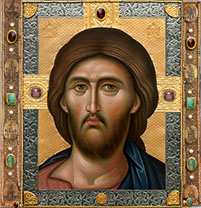 click here for icons of christ
click here for icons of christ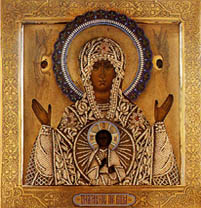 click here for icons of the theotokos
click here for icons of the theotokos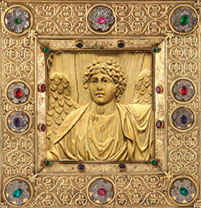 click here for icons of angels
click here for icons of angels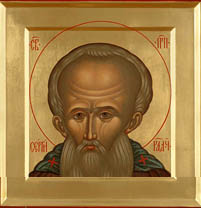 click here for icons of saints
click here for icons of saints








